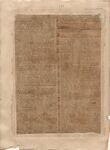HPB-SB-4-196: Difference between revisions
No edit summary |
No edit summary |
||
| Line 29: | Line 29: | ||
| type = article | | type = article | ||
| status = wanted | | status = wanted | ||
| continues = | | continues = 197 | ||
| author = Olcott H.S. | | author = Olcott H.S. | ||
| title =Theosophical Ideas | | title =Theosophical Ideas | ||
| Line 45: | Line 45: | ||
{{Style S-HPB SB. Continues on |4-197}} | {{Style S-HPB SB. Continues on |4-197}} | ||
{{HPB-SB-footer-footnotes}} | |||
Revision as of 03:55, 11 December 2022
< A Society without a Dogma (continued from page 4-195) >
tests of the recognized criterion of logic, or be set up in its niche beside the broken idols of hundreds of antecedent Christian sects. Realizing as they do the boundlessness of the absolute truth, Theosophists repudiate all claims to infallibility. The most cherished preconceptions, the most “pious hope,” the strongest “master passion,” they sweep aside like dust from their path, when their error is pointed out. Their highest hope is to approximate the truth; that they have succeeded in going a few steps beyond the Spiritualists, they think proved in their conviction that they know nothing in comparison with what is to be learned; in their sacrifice of every pet theory and prompting of emotionalism at the shrine of Fact; and in their absolute and unqualified repudiation of everything that smacks of “dogma.”
With great rhetorical elaboration “M. A. (Oxon.)” paints the result of the supersedure of Spiritualistic by Theosophic ideas. In brief, he shows Spiritualism a lifeless corpse—“a body from which the soul has been wrenched, and for which most men will care nothing.” We submit that the reverse is true. Spiritualists wrench the soul from true Spiritualism by their degradation of spirit. Of the infinite they make the finite; of the divine subjective they make the human and limited objective. Are Theosophists materialists? Do not their hearts warm with the same “pure and holy love” for their “loved ones” as those of Spiritualists? Have not many of us sought long years “through the gate of mediumship to have access to the world of spirit”—and vainly sought? The comfort and assurance modern Spiritualism could not give us we found in Theosophy. As a result we believe far more firmly than many Spiritualists for our belief is based on knowledge—in the communion of our beloved ones with us; but not as materialized spirits with beating hearts and sweating brows.
Holding such views as we do as to logic and fact, you perceive that when a Spiritualist pronounces to us the words dogma and facts, debate is impossible, for there is no common ground upon which we can meet. We decline to break our heads against shadows. If fact and logic were given the consideration they should have, there would be no more temples in this world for exoteric worship, whether Christian or heathen, and the method of the Theosophists would be welcomed as the only one insuring action and progress—a progress that cannot be arrested, since each advance shows yet greater advances to be made.
As to our producing our “Seers” and “their records”—one word. In The Spiritualist of January 11th, I find Dr. Peebles saying that in due time he “will publish such facts about the Dravida Brâhmans as I am [he is] permitted. I say permitted because some of these occurred under the promise and seal of secrecy.” If ever the casual wayfarer is put under an obligation of secrecy, before he is shown some of the less important psycho-physiological phenomena, is it not barely possible that the Brotherhood to which some Theosophists belong, has also doctrines, records, and phenomena, that cannot be revealed to the profane and the indifferent, without any imputation lying against their reality and authoritativeness? This, at least, I believe, “M. A. (Oxon.)” knows. As we do not offensively obtrude ourselves upon an unwilling public, but only answer under compulsion, we can hardly be denounced as contumacious if we produce to a promiscuous public, neither our “Seers” nor “their records.” When Mahomet is ready to go to the mountain it will be found standing in its place.
And that no one that makes this search may suppose that we Theosophists send him to a place where there are no pitfalls for the unwary, I quote from the famous Commentary on the Bhagavad-Gîtâ of our brother Hurrychund Chintamon, the unqualified admission that “In Hindostan, as in England, there are doctrines for the learned and dogmas for the unlearned; strong meat for men, and milk for babes; facts for the few, and fictions for the many; realities for the wise, and romances for the simple; esoteric truth for the philosopher, and exoteric fable for the fool.” Like the philosophy taught by this author in the work in question, the object of the Theosophical Society “is the cleansing of Spiritual truth.”
New York, January 20th, 1877.
Theosophical Ideas
...
<... continues on page 4-197 >
Editor's notes
- ↑ Theosophical Ideas by Olcott H.S.

